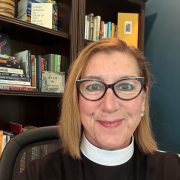“The Power of Voice: Learning from the Syrophoenician Woman’s Sass” Mark Series, Mark 7:24-30: #at the Table

By Julia Madden
In the Gospel of Mark 7:24-30, we find an unexpected encounter between Jesus and a Syrophoenician woman. It is a story in which Jesus, who often holds the role of teacher and healer, is challenged and ultimately “schooled” by a woman with no perceived social power. This text highlights the importance of recognizing the power of marginalized voices, even when they challenge existing structures.
Jesus arrives in the region of Tyre, tired, wanting to be out of sight from the people, probably the demands of ministry and the never-ending need for healing and prayer. Yet, the Syrophoenician woman discovers him. She is perhaps a single mother, a foreigner by birth, who is desperate to find healing for her daughter, who has an unclean spirit. She uses the only things she possesses, her voice and her willingness to use it, to advocate for her daughter’s healing. All these things make her an outsider in this community. Her vulnerability leads her to rely on her agency. Her ability to ask for what her daughter needs is the only thing she has left.
Jesus’ shocking initial response reflects the prevailing social boundaries: “Let the children be fed first, for it is not right to take the children’s bread and throw it to the dogs” (Mark 7:27). This implies a priority for the Israelites, suggesting that those outside this group (like the Gentile woman) are not the focus of his ministry.
The Syrophoenician woman fully understands that she is an outsider, and her lower place in the social order prevents her from requesting help. Yet, she finds the strength to use her voice to advocate for herself and her daughter. She uses her voice, which is all she can leverage now. She will not be told to be quiet, sit down, or not show up. Mitzi J. Smith shares this: “For black women, talk-back and/or sass has been and remains in some situations the only means of agency of being heard and of combating an other-imposed invisibility; it is resistance language, that children, women, people of color and black women in particular, speak and embody inside and outside the black community and institutions.”[1]
There is something in this verse that also speaks to resistance on the woman’s part—something like, “Um, NO, that does not seem right for me or my daughter. Why shouldn’t my daughter be healed?” After all, Jesus was healing all sorts of people in his earthly ministry. Why would he deny this woman’s daughter the opportunity for healing?
However, the woman’s response is audacious: “Sir, even the dogs under the table eat the children’s crumbs” (Mark 7:28). She refuses to accept her exclusion from the scope of God’s grace. Her words challenge Jesus to reconsider the boundaries of his mission and ministry, suggesting that even those considered outsiders have a rightful place at the table. Jesus, perhaps stunned by her belief and persistence, grants her request and heals her daughter. This interaction reflects a moment when Jesus, the teacher, learns from a marginalized woman, expanding his understanding of inclusivity in ministry.
How are we to be Church in light of this text? How would we treat the modern-day version of the Syrophoenician woman if she arrived at our church doors? Would we welcome her, even in her “otherness”? Would we provide the resources to support her and her daughter, or at the very least be able to refer them to a medical and mental health community for care? How would we support her in her new life – cultural integration, practical assistance, and offering her and her daughter a spiritual home? We need systems that encourage the flourishing of the whole: the whole person, whole communities, and whole politics, where we can see liberating work in play, such as reconciliation, healing, social justice, and advocacy. Can we, are we, as Church, willing to respond to calls for justice today, especially around the issues of race, gender, ethnicity, immigrant/refugee status, access to health care, including mental health care, affordable housing, and access to employment?
The story of the Syrophoenician woman is a reminder that the agency of voice has the power to shift perspectives and expand the boundaries of what is possible. Her boldness in speaking up transformed the direction of Jesus’ ministry, showing that authentic leadership involves the humility taught by those who challenge us. This work requires courage and vulnerability to shift our perspectives, just as Jesus did, and to recognize the voices calling for change. Only when we fully hear other perspectives are we able to begin the hard work of breaking down barriers, creating opportunities for people and communities to thrive and flourish, and to be fully part of the kingdom of God.
Julia Madden, is a Transitional Deacon in the Episcopal Diocese of Western North Carolina currently serving at St. Luke’s and Church of Our Saviour, Lincolnton, NC. She holds an MDiv from The General Theological Seminary.
[1] Mitzi J. Smith, “‘Race, Gender, and the Politics of Sass:’ Reading Mark 7:24-30 Through a Womanist Lens of Intersectionality and Inter(con)textuality,” in Womanist Sass and Talk Back: Social (In)Justice, Intersectionality, and Biblical Interpretation (Eugene: Cascade Books, 2018), 28-45; quote on 29.




